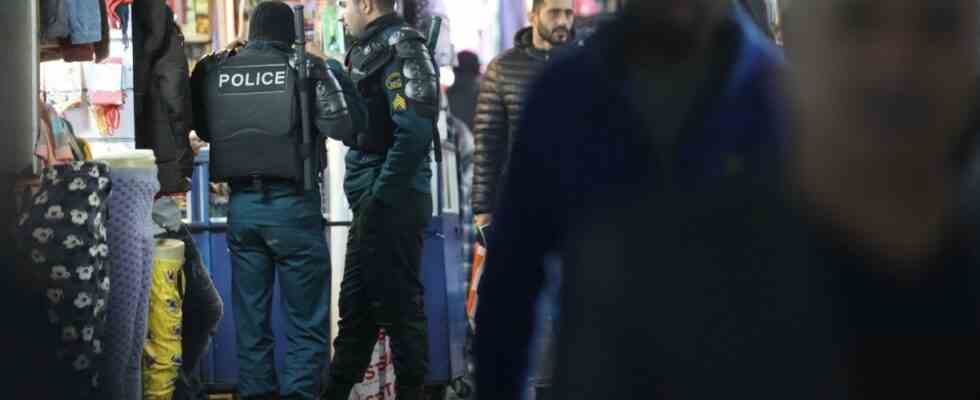During a general strike called by the Iranian protest movement, a former president and political reformer sided with the opponents of the regime: Iran’s ex-president Mohammad Khatami said on the official student holiday that the Tehran leadership must approach the protesters “before it’s too late”. .
Khatami was President from 1997 to 2005. After two terms in office, his initially successful attempts at reform failed because of the Islamist regime. He had largely withdrawn from political life in recent years.
Even on the third day, it is difficult to judge how strongly the nationwide general strike called by the protesters is being followed. Videos on social media show closed shops and security forces on the streets of Tehran. According to agency reports, however, many shops were open. It is said to be different in the Iranian Kurdish region, where the call for a strike is being followed more closely, according to dpa, and the situation is said to be extremely tense.
“Freedom must not be suppressed under the pretext of internal security”
The now 79-year-old ex-president Khatami primarily protected the students. The security forces act against them with particularly great brutality. “Freedom and internal security must not be offset against each other,” Khatami warned the state leadership. “Freedom must not be suppressed under the pretext of internal security.” In a concession to the regime, he restricts: “But internal security must not be neglected in the name of freedom either.”
Khatami risks a lot. The Shia Islamist regime has previously arrested respected dignitaries critical of the regime or placed them under house arrest for years. Nevertheless, the ex-president praised “the beautiful slogan” of the protest movement. This was created after the death of 22-year-old Mahsa Amini in September. The demonstrators, who are mainly led by young women, are still shouting “Woman, life, freedom” to this day. Amini was apparently seriously injured when she was arrested by the so-called moral police. She died in a hospital three days later.
It remains unclear what effect Chatami’s admonishing words can have. So far, there has been little sign of the regime giving in. The government has not yet confirmed the end of the “moral patrol” announced at the weekend, which is particularly hated by many Iranian women.
However, the spiritual leader Ayatollah Ali Khamenei had consulted with the Supreme Council of the Cultural Revolution on Tuesday. According to dpa, the meeting of the de facto head of state with President Ebrahim Raisi, Parliament Speaker Bagher Ghalibaf and Justice Chief Gholam-Hussein Mohseni-Edschehi was also about the future of the moral police.
A rapper shows remorse – in a video by prosecutors
Several death sentences imposed in sham trials speak for the determination to remain harsh. The guilty verdicts against participants in the protests, in which almost 500 demonstrators and several dozen security forces were killed, are “depravity on earth” or “war against God”: it says death by hanging.
Another example of the theocratic regime’s relentlessness is its treatment of an imprisoned musician, rapper Toomaj Salehi. He had joined the protest movement and filmed himself at demonstrations. In a CBS interview, he said Iran’s leadership was “a mafia ready to kill the people to keep their power, their money and their weapons.”
The prosecutors have now edited a video in which they show the alleged confession of the popular singer. The 31-year-old, who supported the demonstrators with his songs, says remorsefully into the camera: “Music can promote violence. I apologize to you and to society for triggering violence.”
The video clip is accompanied by music and, after a long shot typical of music videos, shows the musician with another man at a table under waving white towels: it is actually the prelude to one of the rapper’s own videos critical of the government, which verbally addresses the man at the table in a harsh manner . However, here is a cut from the film. Again the musician sits at a table. But now in a room reminiscent of an interrogation room. He sits across from an investigator.
The conversation with the official, the confession made and the apology seem forced. Salehi, who was arrested in Isfahan at the end of October, is clearly under a lot of pressure during the recording. According to his family, he was tortured in detention. Salehi faces the death penalty on charges of “depravity on earth.”
The fact that he drinks coffee from a dainty cup during his alleged confession, as in his own music clip, makes the interrogation video a testament to the regime’s cynicism.
The clip is an example of the fact that those in power are aware of the propagandistic potential of digital media and want to use it. The clip was published by the pro-government agency Tasnim. For the regime, as for the protest movement, it is about determining the narrative of the events. The clips distributed via social media, which use the aesthetics of modern short and music videos, are particularly suitable for this.

